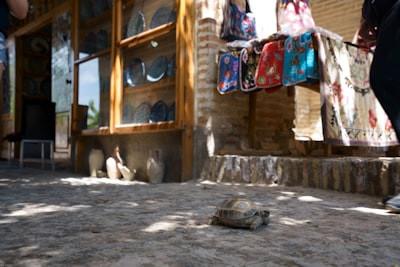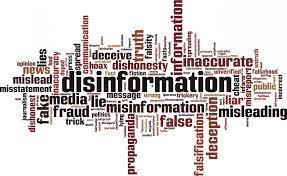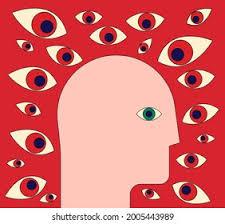Identifying conspiracy theories
Curated from: ec.europa.eu
Ideas, facts & insights covering these topics:
18 ideas
·885 reads
6
Explore the World's Best Ideas
Join today and uncover 100+ curated journeys from 50+ topics. Unlock access to our mobile app with extensive features.
Fighting Disinformation - Identifying conspiracy theories
What are conspiracy theories?
The belief that certain events or situations are secretly manipulated behind the scenes by powerful forces with negative intent.
Conspiracy theories have these 6 things in common:
- An alleged, secret plot.
- A group of conspirators.
- ‘Evidence’ that seems to support the conspiracy theory.
- They falsely suggest that nothing happens by accident and that there are no coincidences; nothing is as it appears and everything is connected.
- They divide the world into good or bad.
- They scapegoat people and groups.
10
120 reads
Flourish and Take Root
Why do they flourish?
They often appear as a logical explanation of events or situations which are difficult to understand and bring a false sense of control and agency.
How do they take root?
Conspiracy theories often start as a suspicion. They ask who is benefiting from the event or situation and thus identify the conspirators. Any ‘evidence’ is then forced to fit the theory.
Once they have taken root, conspiracy theories can grow quickly. They are hard to refute because any person who tries is seen as being part of the conspiracy.
10
81 reads
People spread conspiracy theories for different reasons:
Most believe they are true. Others deliberately want to provoke, manipulate or target people for political or financial reasons. Beware: They can come from many sources e.g. internet, friends, relatives.
10
90 reads
To prevent conspiracy theories - know that they exist. Be aware. Stop the spread.
Is this a conspiracy theory? Check before sharing
Check the author – who is writing this and why?
Unlikely to be a conspiracy theory
- The author has recognised qualifications and credentials in the topic
- The author uses verifiable facts and evidence from scientific or academic research
Likely to be a conspiracy theory
- The author is a self-proclaimed expert and not attached to a reputable organisation or institution
- Author claims to have credentials but they don’t withstand scrutiny or are suspended
10
60 reads
Check the source – Is it reliable and reputable?
Likely Reliable and Reputable
- The source has been quoted by several reputable media outlets
- The information is backed by many scientists/academics
- Independent fact-checking websites support the source and related claims
Unlikely Reliable and Reputable
- The source of information is not clear
- The information is shared only by self-proclaimed experts
- Independent fact-checking websites do not support the source and have refuted related claims
10
48 reads
Check the tone and style – Is it balanced and fair or sensationalist and one-dimensional?
Likely Balanced
- The author does not shy away from exploring complexity, including different perspectives
- The author is prepared to acknowledge limits to their knowledge
- The tone is objective, factual
Unlikely Balanced
- The author presents their information as the only valid truth
- The author raises questions instead of providing answers
- The author demonises whoever they assume is behind the alleged secret plot
- The tone is subjective, emotionally charged
- Emotional images or anecdotes are used to illustrate the message
10
43 reads
What is a real conspiracy?
Real conspiracies large and small do exist. They are more often centred on single, self-contained events or an individual like an assassination or a coup d’etat. They are unearthed by whistle-blowers and the media, using verifiable facts and evidence.
10
50 reads
Conspiracy theories: What about my own beliefs?
Nobody is free of biases or fears, which could open the door to believing in a conspiracy theory.
10
46 reads
Conspiracy theories can be dangerous
Conspiracy theories often target or discriminate against an entire group perceived as the enemy behind a real or imagined threat. They polarise society and fuel violent extremism. While most people who spread conspiracy theories genuinely believe in them, others deploy them cynically to achieve these effects.
10
43 reads
How conspiracy theories damage
They identify an enemy and a secret plot that threatens peoples' lives or beliefs and spark a defence mechanism, which can fuel discrimination, justify hate crimes and can be exploited by violent extremist groups.
They spread mistrust in public institutions, which can lead to political apathy or radicalization.
They spread mistrust in scientific and medical information, which can have serious consequences.\
10
36 reads
How conspiracy theories damage (continued)
Watch out: Perceived "out groups" of society are especially prone to be targets of conspiracy theories, hate speech and disinformation campaigns. This includes people of different origin, religion or sexual orientation.
Conspiracy theories can have serious consequences. Take them seriously. Check before sharing. Stop the spread.
10
34 reads
Debunking conspiracy theories
Stopping the spread of conspiracy theories is challenging. There is no one-size-fits-all approach. It depends on the level of exposure. People who firmly believe in conspiracy theories are extremely difficult to reach.
10
33 reads
DEBUNKING – Facts and logic matter
Do's
- Focus on the facts you want to communicate, not the myth you want to debunk.
- Choose your target – the author, source or logic behind the conspiracy theory.
- Always state clearly that the information is wrong, before quoting a conspiracy theory.
- Provide a fact-based alternative explanation.
- If possible, use visual aids to back your argument.
DON'Ts
- Don't focus on the conspiracy theory first. Don't reinforce it.
- Don't overwhelm with information.
10
27 reads
How to talk to somebody who firmly believes in conspiracy theories
Many conspiracy theorists are deeply convinced of their beliefs. Their whole life and worldview are centred around them.
10
35 reads
When talking to somebody who firmly believes in a conspiracy theory be aware that:
- Any argument challenging the conspiracy theory may be taken as proof that you are part of the conspiracy and reinforce the belief.
- They probably believe in more than one conspiracy theory.
- They will probably argue hard to defend their beliefs.
10
35 reads
So, what can you do?
- Encourage open debate and questions.
- Ask detailed questions about their theory in order to trigger self-reflection.
- Enlist trusted former conspiracy theorists who once believed the same thing.
- Be cautious and use a variety of sources around the theme.
- Don't ridicule. Try to understand why they believe what they believe.
- Show empathy. Often the person may be truly fearful and distressed.
- Go step by step. Focus on simple facts and logic instead of covering every detail.
- Don't push. Too much pressure might backfire. Leave them time to process and try again.
- Use empathy and questions.
10
32 reads
Stop the spread.
Be careful, conspiracy theories are deceptive: they ignore scientific evidence and falsely blame individuals and groups that are not responsible for the pandemic. Do not share them.
10
33 reads
Paranoia Fact or Fiction?
“Just because you're paranoid doesn't mean they aren't after you.”
-Joseph Heller, Catch-22
11
39 reads
IDEAS CURATED BY
CURATOR'S NOTE
Fighting Disinformation - Identifying Conspiracy Theories
“
Tom Joad's ideas are part of this journey:
Learn more about problemsolving with this collection
How to create a productive environment
The importance of self-care in productivity
How to avoid distractions
Related collections
Similar ideas
9 ideas
3 ideas
The Psychology Behind Conspiracy Theories
healthline.com
3 ideas
Why Do People Believe in Conspiracy Theories?
verywellmind.com
Read & Learn
20x Faster
without
deepstash
with
deepstash
with
deepstash
Personalized microlearning
—
100+ Learning Journeys
—
Access to 200,000+ ideas
—
Access to the mobile app
—
Unlimited idea saving
—
—
Unlimited history
—
—
Unlimited listening to ideas
—
—
Downloading & offline access
—
—
Supercharge your mind with one idea per day
Enter your email and spend 1 minute every day to learn something new.
I agree to receive email updates


